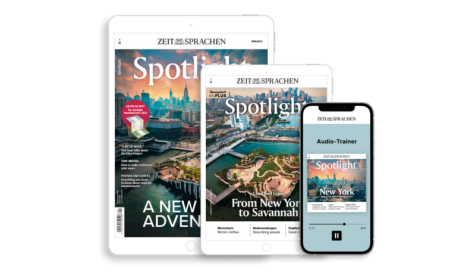Starten Sie den Audio-Text
Mit dem Audio-Player können Sie sich den Text anhören. Darunter finden Sie das Transkript.
Transcript: You can’t always get what you want
Ordering coffee used to be simple — you could have it black, or with milk or cream. Nowadays, things are a lot more complicated. Do you want regular or espresso? How about a latte, mocha, cappuccino or Americano? Milk? Well, you can have whole milkVollmilchwhole milk, non-fat, soySojasoy, coconut or almondMandelalmond. It can all get quite confusing. But it’s not just the types of coffee that have changed. As Spotlight’s British columnist, Colin Beaven, has discovered, if he wants his coffee, he’ll need to change the way he asks for it, too.
I need to relearn how to order a cup of coffee. If I were to follow the national trend, I would go to a coffee shop (there are now millions to choose from), and when to be one's turnan der Reihe seinit’s my turn to order, I would say: “Can I get a large Americano?”
It’s not the Italian that’s difficult. Americano, cappuccino, Montepulciano: like many other things in life, they all end in “no”. That’s something I’m used to. It’s the English that’s a struggle. “Get” seems wrong. Shouldn’t you say “have”? Asking if you can “get a cup of coffee” sounds as if you want to to fetchholen, beschaffenfetch one, which seems silly when you’re standing in a coffee shop. They already have plenty.
Generally in coffee shops, you order your coffee at the counterTresencounter, unlikeanders alsunlike abroad, where you sit at a table and wait for someone to notice you. But in places where you do sit down, the phrase “Can I get...?” sounds even stranger. “No, I’ll bring it to you. That’s my job.” That’s how I’d expect waiters and waitresses to answer.
Shouldn’t we save “Can I get...?” for other questions, like “Can I get food poisoning from eating one of your panini?” It may all seem trivial — just one more change in the language. But it may be another example of the way that American English is taking over.
That’s what Matthew Engel fears is happening. He calls it “the American conquestEroberung, Unterwerfungconquest of English”. His recent book, called That’s the Way It to crumblezerfallen, bröckelnCrumbles, explains that we’re using so many American phrases that British English is on the way out.
Change in the language always raises eyebrows. In the old days, the word “can” would’ve been just as questionablefragwürdigquestionable. At school, I was taught to avoid “Can I...?”. We had to say “May I...?” if we were asking permission.
Today, the phrase “May I...?” sounds overformal. And “may” means other things anyway. It means possibility, in sentences like “British English may completely disappear”. It can also be a name: Theresa May, for example. As British prime minister, Theresa May called a general election earlier this year. She thought she’d win a big majority. After all, it worked for Margaret Thatcher in 1983 and 1987.
May was presented as a strong leader, as someone who can be “a bloodyverdammtbloody difficult woman” — as if she thought that being a difficult woman made her a cult figure. Margaret Thatcher used that strategy — at least for a while. There were even fears that Theresa May would become such a cult figure that we’d get a new Soviet-style holiday — another May Day.
We all thought she’d win. In fact, though, she lost her majority in parliament and soon had to ask politicians from Northern Ireland for help. That’s a different sort of Maydayinternationaler Notruf, SOSMayday.
Perhaps the clueHinweis, Schlüsselclue was in her name: not Theresa Will or even Theresa Can, but Theresa May. If your name’s a modal verb, you should try to choose the most useful one. Anyway, as The Rolling Stones tell us, “You can’t always get what you want” — though you have a better chance in coffee shops than in politics.
Neugierig auf mehr?
Dann nutzen Sie die Möglichkeit und stellen Sie sich Ihr optimales Abo ganz nach Ihren Wünschen zusammen.



